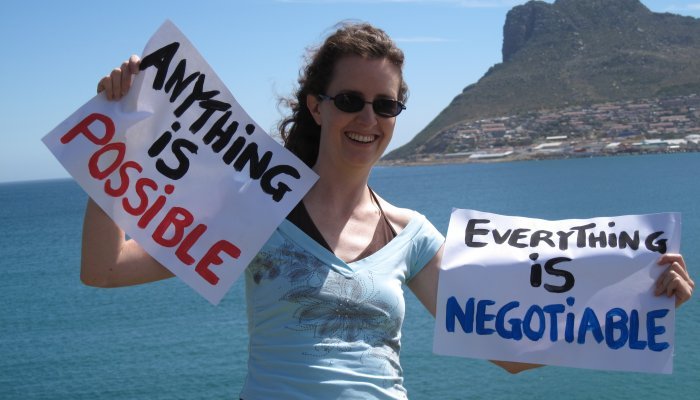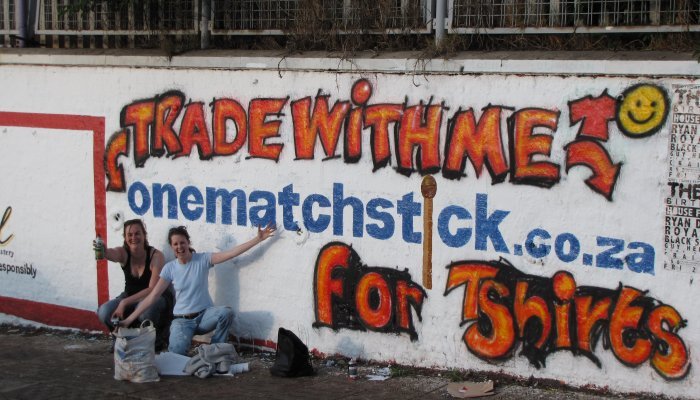For example, if I grow spinach and I want to trade my excess greens for a haircut, I need to find a hairdresser who will be willing to trade his or her services for my spinach. It might take time to find this person – time that I can’t spend on other productive activities. If I take too long, my spinach will wilt and go to waste. I might only find a hairdresser who wants to trade something I can’t offer. Or perhaps the person will want spinach but believes a haircut is worth double the amount I have available to trade. Even if I agree to supply more later, there’s no guarantee for the hairdresser that my crop won’t fail, or that I will supply greens of the same quality.
It's a silly example, but it neatly illustrates some challenges of bartering: the difficulty of locating a double coincidence of wants, a lack of a common value measure, the challenge of storing wealth, the lack of a standard for deferred payments, and the indivisibility of wealth (nobody wants half a haircut!)
Bartering does offer benefits, however. Cobus Naude, CFO at Bartercard SA, says bartering is still relevant in today’s predominantly cash-based economy. “Everyone is looking for ways to hold on to their cash and take the pressure off their cash flow,” he says. “Bartercard facilitates that by making it possible for members to access the goods and services they need to grow and trade by spending ‘trade rands’. If these trade rands can be earned by selling excess goods and services, that’s a double benefit to the business.”
Bartercard was launched in South Africa just over two years ago and has been operating in Australia for 25 years. The company operates in 10 countries and has a network of more than 50 000 members globally.
Naude explains that the idea is to create a network of businesses that can pay for each other’s goods and services in trade rands without having to meet the classic direct barter conditions of a coincidence of wants. “Members accrue trade rands, which equate to the same rand value of goods and services, which can be bartered for goods and services supplied by any other member in the network,” he says. “The major benefits are that businesses can reduce their cash expenses and increase their sales through the network. Trading lower cost, off-peak or excess capacity with a low cost to the company yields the greatest business benefits. Members also benefit from the support and exposure they receive from other businesses in the member network.”
Everyone is looking for ways to hold on to their cash and take the pressure off their cash flow.
Bartercard SA member Gary Weineck, MD of Anjere Business Consulting, has had positive bartering experiences since signing up with Bartercard in 2016. “I liked the idea that I could use my surplus capacity to pay for some of my lifestyle and business expenses,” he says. “My time is my stock and obviously once available time has passed, I can't sell it. Through Bartercard I was able to ‘bank’ that time by selling it to members using a virtual currency instead of cash, and then use that virtual currency to purchase.”
Weineck has exchanged trade rands for everything from accommodation to vehicle repairs, legal fees and restaurant meals, both in South Africa and while travelling in the UK. “It is particularly nice that there is no fixed term contract and your trade rand balance does not expire and can be spent in a growing number of countries.”
Naude says Bartercard’s members range from web designers to hotels, printers, courier companies and property developers. A commission of 6.5% is charged on transactions. This goes to Bartercard, which facilitates the transactions. “Bartercard fees are paid in cash and members gain access to the Bartercard network in return. This includes marketing through the member network, and access to Bartercard’s electronic services, which is a bank-like system of recording transactions and trades, a monthly statement, trading platform and a user-friendly mobile app,” he says. “We are still growing the South African member network, so currently have a flexible approach to joining fees and are kickstarting new members with trade rand credit to build up the network and get everyone trading.”
Some people find it difficult to get their heads around how the trading works, Naude admits. “Transactions don’t need to be direct – between two members. For example, a restaurateur who uses a printer’s services does not need to pay the printer back in meals. The printer can take those trade rands earned and use them to buy from other members – a web designer, lawyer, electrician, car service centre, etc. Others find the concept of trade rands confusing. It’s a one-for-one trade, so R1 equals 1 trade rRand. The value of what is bought is costed the same way it would be in cash.”
Bookkeeping follows the same process as if cash were being exchanged. “The only difference is in the method of payment,” says Naude. “Trade rands are accounted for. Invoices are generated and paid and, if the members are VAT vendors, VAT is payable to SARS on all transactions, the same way they would if the transaction was in cash.”
Occasional exchange
Even without membership of a formal bartering network like Bartercard, business trade exchanges are more common than one might think. “I’ve written marketing copy in exchange for linen, wine and holidays,” says Caroline Hurry, editor in chief of Travelwrite.co.za. “I’m very partial to a trade exchange and usually the other party has approached me suggesting a barter instead of hard cash. I invoice at my hourly or word rate. The client then pays me the financial equivalent in wine, linen or bed nights somewhere nice. I even exchange fresh eggs for an extra guitar lesson occasionally. It’s always been an ad-hoc arrangement and I probably need to adopt a more structured approach. Still, I love the concept because it’s a way of treating yourself to some of life’s luxuries that might not have been affordable otherwise.”
Peter Dros, sales and marketing director for Fancourt, says bartering accommodation is common in the tourism industry. “We have international travel trade partners or tour operators that publish travel brochures. The tour operator (that is a wholesaler selling to travel agents) would feature Fancourt in the brochure on a barter basis, so, for example, we get exposure in Germany in a brochure on the travel agent’s shelf or website for consumers to look at.”
Dros says these arrangements normally develop out of trusted business relationships and are negotiated on an individual basis. “If it is a new business we are starting off with, we may specify that they can only redeem the barter on the third booking, so the tour operator then also needs to make an effort on their side and it’s not just Fancourt being used. When they make a booking with us, we deduct the (predetermined) value of the barter, so they are paying us a nett booking value. It is all invoiced to make sure the books balance.”
Trading up
Telana Simpson, courage coach at Inner Coaching, has been bartering since she was a child. She really began to put trading to use as an adult after hearing of Kyle MacDonald, who made a series of trades, starting with one red paperclip and ending with a house.
Simpson was inspired to do the same, starting with one matchstick and aiming to eventually acquire office space for her company. She called her project One Matchstick and has been working on it for the last few years. “My latest item up for trade is a collection of tech and gadgets (three boxes full!) that will take someone off the grid and help make them mobile – for those active, on-the-go people, or those who don’t want to be office-bound,” she says. “I’m accepting trade offers via Onematchstick.co.za.”
4 tips for business trades
1. Just go for it. “Explore options at least, as you’ll be surprised as to how trading can work out well,” says Simpson. “Ask the person if they would consider trading rather than doing the usual cash transaction. Your chances of a yes go from 0 to 50% just by asking! It’s 100% no when you don’t even ask. Everything is negotiable, as long as you both want to make the trade work.”
2. Establish boundaries. Just as you would draw up a formal contract for any other exchange, bartering should be no different. Pin down exactly what is included from each party’s side and set clear timeframes, deliverables and values.
3. Keep records. Remember that VAT is payable to SARS on barter transactions and, in terms of section 20(1) of the VAT Act, VAT registered companies are required to provide tax invoices, for cash and barter transactions alike.
4. Understand that Bitcoin exchanges are treated as barter transactions. In April 2018, SARS noted that it will “continue to apply normal income tax rules to cryptocurrencies and will expect affected taxpayers to declare cryptocurrency gains or losses as part of their taxable income.” Where goods or services are exchanged for Bitcoin or another cryptocurrency, SARS says these transactions will be regarded as a barter transaction and normal bartering tax rules apply.











